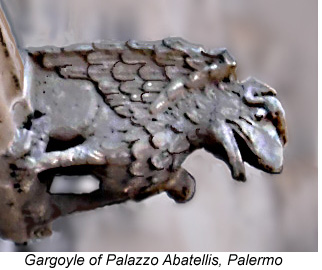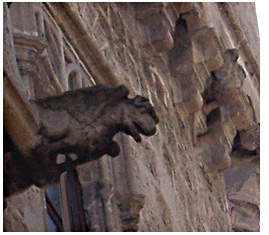...Best of Sicily presents... Best of Sicily Magazine. ... Dedicated to Sicilian art, culture, history, people, places and all things Sicilian. |
by Carlo Trabia | |||
Magazine Index Best of Sicily Arts & Culture Fashion Food & Wine History & Society About Us Travel Faqs Contact Map of Sicily
|
Gothic gargoyles made their first appearance in the waning years of the twelfth century, but they are a rarity in Sicily, where "Romanesque-Gothic" churches and castles rarely featured decorative roof spouts. It was the later introduction of the Catalonian Gothic and Renaissance styles that saw the arrival of Sicily's first true gargoyles. The one shown on this page may be seen overlooking Via Alloro at Palermo's Palazzo Abatellis (now one of several regional art museums in Sicily), which was constructed late in the fifteenth century, at the tail end of the Middle Ages, and resembles a castle. The portico of Palermo Cathedral also has gargoyles. The gargoyles of Palermo Cathedral's Catalonian Gothic portico actually resemble angels, while those of Palazzo Abatellis are clearly griffons - very appropriately since that winged beast figures in the Abatellis coat of arms. Historians have long debated the irony in incorporating what appear to be mythological or even demonic figures into the design of churches such as Notre Dame in Paris. One theory advanced in explanation is that the spirits represented by these unsightly creatures could defend Christians against the far uglier demons, evils and sins which might seek to seduce the faithful into Hell. Another suggests that the gargoyles serve to remind Christians of what awaits the less devout if their souls indeed end up in the least pleasant of places.
Gargoyles do not enjoy the exalted place in Sicilian folklore that they do in north-western Europe, where gothic motifs echo popular legend and even heraldic symbolism. In Italy the Renaissance ensured a wholly different spirituality reflected in the construction of giant cupolas, wide naves and pseudo-classical ornamentation based on a rediscovery of realism. Milan's giant gothic cathedral, where gargoyles abound outside despite bizarre neo-classical touches inside, was a prominent exception. A pure Gothic architectural form might have found a place in Sicily during the reign of Frederick II, who sanctioned the construction of Cologne Cathedral despite his running feud with that city's bishop. Alas, this was not to be, but Sicily's few gargoyles maintain their silent vigil through the centuries. About the Author: Architect Carlo Trabia has written for this publication and others. | ||
Top of Page |
 In gothic architecture
a gargoyle is a stone roof spout carved in the form of a grotesque
or fantastic creature designed to convey rain water away from the roof and
exterior wall of a church, castle or other building. In precise terms, chimeras
and grotesques, which do not function as water spouts, are not gargoyles, but certain
forms of gargoyle are sometimes classified as functional grotesques.
The classic gargoyles of gothic architecture are usually winged creatures
resembling dragons or birds, closely related to some of the winged
beasts of
In gothic architecture
a gargoyle is a stone roof spout carved in the form of a grotesque
or fantastic creature designed to convey rain water away from the roof and
exterior wall of a church, castle or other building. In precise terms, chimeras
and grotesques, which do not function as water spouts, are not gargoyles, but certain
forms of gargoyle are sometimes classified as functional grotesques.
The classic gargoyles of gothic architecture are usually winged creatures
resembling dragons or birds, closely related to some of the winged
beasts of  Ugly though they may be, gargoyles are at least interesting. They've
found their way into numerous neo-gothic structures across Europe and in
the Americas, where modernised stainless-steel gargoyles guard the Chrysler
Building, a towering monument to the Art Deco movement.
Ugly though they may be, gargoyles are at least interesting. They've
found their way into numerous neo-gothic structures across Europe and in
the Americas, where modernised stainless-steel gargoyles guard the Chrysler
Building, a towering monument to the Art Deco movement.